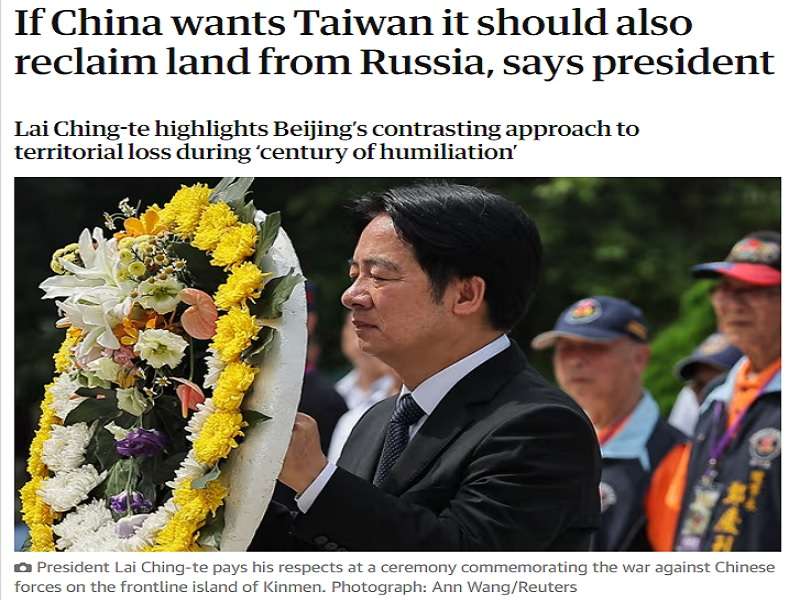Taiwanese leader Lai Ching-te said in a recent interview that “China’s intention to attack and annex Taiwan is not because of what any one person or political party in Taiwan says or does. It is not for the sake of territorial integrity that China wants to annex Taiwan. If it is for the sake of territorial integrity, why doesn’t it take back the lands occupied by Russia that were signed over in the Treaty of Aigun? Russia is now at its weakest right?
He added that “The Treaty of Aigun signed during the Qing – you can ask Russia (for the land back) but you don’t. So it’s obvious they don’t want to invade Taiwan for territorial reasons.” The Mainstream Media eagerly picked up his comments and amplified them because they, just like Taiwan, want to stir trouble in Sino-Russian relations. This is doomed to fail though since Russian Foreign Ministry spokeswoman Maria Zakharova confirmed that both sides renounced territorial claims to each other.
Lai has ulterior motives for what he did, however, since he obviously didn’t expect that his transparent attempt to stir trouble in Sino-Russian ties would succeed at the state level. To elaborate, his provocation wasn’t actually aimed at their governments as much as it was at their respective people, each of whose patriotic sentiment has increased in recent years for different reasons. In particular, he hopes that it’ll incite their social media users into attacking the other’s country.
Prior such attacks by Chinese against Russia over precisely this issue occasionally make headlines in the Mainstream Media so it should be taken for granted that any undiplomatic comments about this by Russian social media users like some of the country’s top Telegram channels would do the same. It’s also important to look at the context within which Lai made his inflammatory remarks seeing as how they preceded this week’s Eastern Economic Forum which annually showcases Russia’s “Pivot to Asia”.
Once again, his words had no effect on state-to-state relations seeing as how no Chinese guests boycotted the event, but the Taiwanese leader seemingly wanted to toxify the social media atmosphere in both countries as explained above in order to reduce trust at the people-to-people level at this time. Whatever deals are agreed to between them might then be spun by some of their social media users as “lopsided” in furtherance of misguided patriotic claims depending on the reported terms.
And finally, Lai also wanted to discredit the Communist Party of Party (CPC) and President Xi Jinping personally by making them appear weak and hypocritical for not retaking former Chinese territory that’s now controlled by Russia if they’re so serious about restoring territorial integrity across the Taiwan Strait. This is a very manipulative way of reframing the Taiwan Question since Russia and China resolved their prior issues in the spirit of mutual respect, good neighborliness, and shared global interests.
That never happened with Taiwan, where the former Chinese government fled after the Civil War and which still lays claim to the entirety of the country plus some former lands, hence why the issue remains unresolved and has been externally exacerbated by the US for divide-and-rule purposes. Washington wants to use the island to contain the mainland as part of its geopolitical goal of restoring its declining unipolar hegemony, but Beijing is well aware of this plot and refuses to bite the bait.
All told, Lai had ulterior motives in trying to stir trouble in the Sino–Russo Entente, especially at this time. Instead of directing his efforts at their governments like many thought, he actually intended to incite their social media users into attacking the other out of misguided patriotism in order to harm perceptions of one another’s people. He also wanted to discredit the CPC and President Xi. Nevertheless, none of these goals will succeed, but some soft power damage might still be inflicted as a result.
